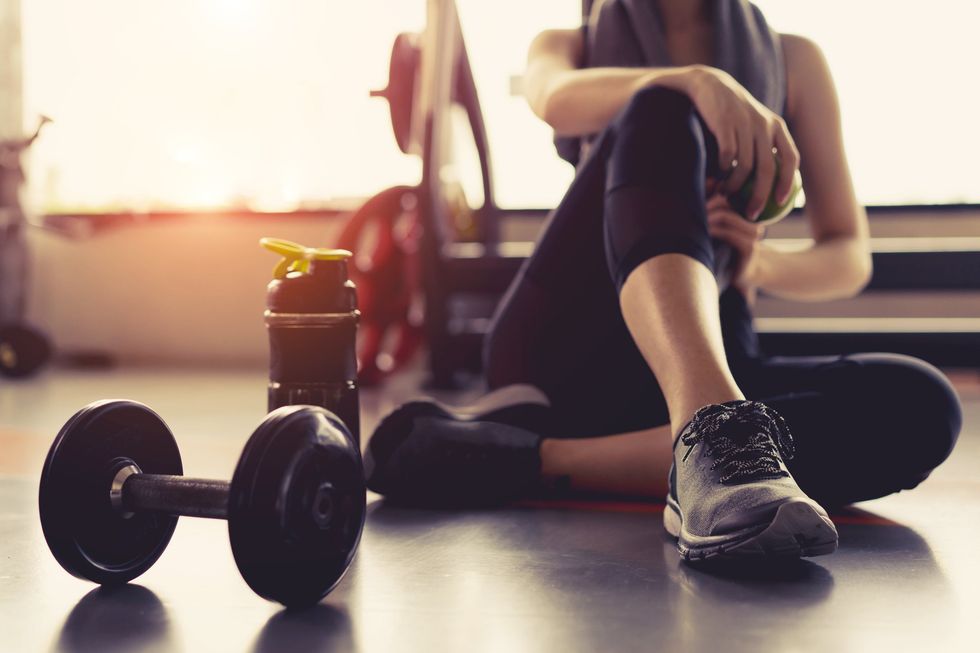It can be difficult to factor in fitness into our modern lifestyle, and new research from PureGym proves this as it shows the nation’s lack of mobility and inability to do some day-to-day activities.
The study found that with half of Brits (50 per cent) admitted that they struggle to get up from the sofa, as well as struggle with other day-to-day tasks, such as walking uphill, and basic physical exercise, in a survey of 2,004 people aged 16+ in the UK.
While, a third of the population (34 per cent) don’t exercise weekly and that almost a quarter (23 per cent) don’t see themselves as healthy from any point of view, according to previous research.
Sign up to our free Indy100 weekly newsletter
To outline the basic level of fitness, PureGym Portsmouth PT Phil Carpenter created a set of benchmarks applicable to people of any age and gender.
Analysing seven basic exercises: tricep dips, push ups, squats, slow squats, deep squats, a 1.5 mile (2.4km) run and a toe touch, the results reveal many fall short of these ‘base level’ benchmarks, with an average of a third of the population are unable to complete any of them.
Running 1.5 miles was the activity the participants found the most difficult, nearly 4 in 10 people (38 per cent) stated that they would be unable to complete a 1.5 mile run, regardless of how much time they had to do so.
Though this wasn't the only exercise, some of the participants said they would not able to compete.
Other ones include strength-based exercises as a third (34 per cent) of people are unable to complete a single tricep dip, with 5.63 being the average number of reps completed - which is the minimum benchmark expected for someone aged 60 or above.

Squats were also a struggle since a quarter of the population (27 per cent) are unable to complete a single one, with the average person only able to complete 9.58 squat reps before failure - which according to benchmarking, is equivalent to a ‘poor’ effort for men aged over 56 years old, or women over 36.
"The average person who works in an office spends most of their time sat or laid down," Phil noted how our working lives means exercising takes a back seat.
"We wake up after a night of lying down, sit down to eat breakfast, drive to work, get a lift to the right floor, and sit at a desk until 5pm, often with lunches spent at our desks," and added chores outside of work e.g. cleaning, food shopping, means many of us feel exhausted and going to the gym "seems impossible."
“Sedentary lifestyles have a huge impact on our mobility. When we do not use our muscles in the intended way, we lose range of motion and strength. Sitting down all day can cause tight hamstrings, weak hip flexors and glutes, weak upper back muscles, poor posture, and more.”
A lack of fitness has also translated into people struggling with day-to-day movements with walking up a hill being the biggest at 69 per cent, followed by getting up from sitting on the floor (64 percent), getting out of breath walking upstairs (55 per cent), getting up from a chair/sofa (47 per cent).
"Poor flexibility," is what 69 per cent of people cited as a daily struggle, with 68 per cent mentioning stiff or tight muscles.
This is confirmed in the study’s toe touch tests, with 4 in 10 (44 per cent) unable to successfully touch their toes. Often viewed as a barometer of a person’s flexibility, 23 per cent are only able to reach their sock line, or less.
Phil says: “Mobility is our bodies’ secret superhero, one that we don’t realise is there until we begin to lose it as we age. Having good mobility and flexibility allows us to move through a bigger range of motion, with less risk of injury."
The personal trainer recommended yoga, tai chi and pilates to improve mobility, though added simpler steps such as getting up, moving and stretching every hour or two that you're inactive "will make a difference."
Here are Phil's tips to turn fitness around:
- Set small, achievable goals: “Start by setting SMART goals and recording these down. It’s better to start with small, sustainable changes and build on these. Something as simple as having a step goal or working out twice a week is a great place to start”.
- Aim to do some form of physical activity everyday: “Whether it’s walking, gardening, housework, or more vigorous exercise such as gym based or sports such as swimming, tennis, we need to be raising our hearts rates within safe limits, at least twice a week to benefit from reducing the risk of chronic diseases and sickness such as heart disease, stroke.”
- Become more active throughout the day: “Lifestyle changes are just as, if not more, important, as working out. If you work out for 45 minutes a day but spend the rest of the day completely inactive, you’re fighting a losing battle! Small ways to increase activity and improve mobility include taking the stairs instead of the lift, walking while talking on the phone, and sitting on the floor instead of the sofa.”
Read about the full PureGym study here.
Have your say in our news democracy. Click the upvote icon at the top of the page to help raise this article through the indy100 rankings.














